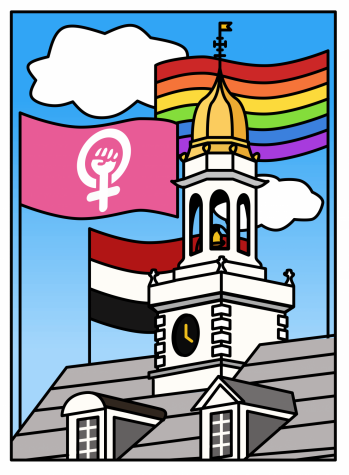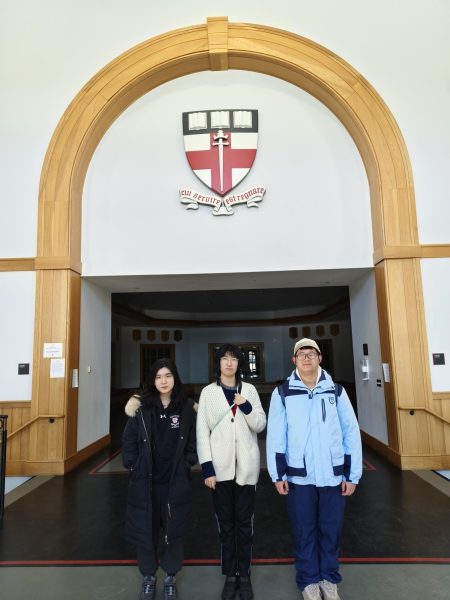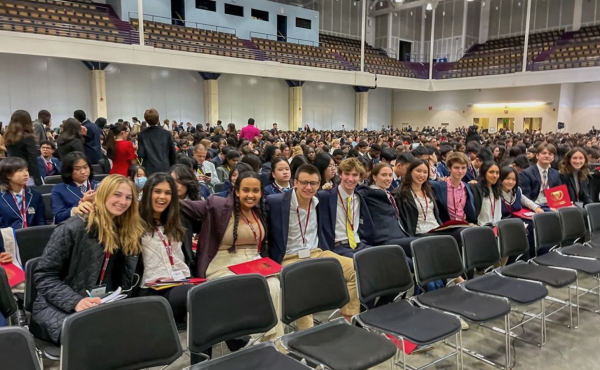New additions to the 2017-18 Course Catalog

Laurie Sales teaches her elective, Public Speaking.
As Sixth Formers begin to focus on their imminent departure from the school, the rest of the student body looks towards the next year – more specifically, towards their course selections. The 2017-2018 Course Catalog brings substantial changes to selections available for students. Confirmed course additions include a yearlong math course, a term history elective on the rise of the American conservative movement, and two new English electives. Smaller adjustments will occur in both performing arts and archaeology classes.
Groton math teachers Jonathan Choate and Jon Creamer will be jointly teaching “Linear Algebra and Multivariate Calculus,” offered to students who have completed calculus. The class will cover its two titular topics: multivariate calculus, which offers the opportunity to use calculus in three dimensions, and linear algebra, which focuses on the algebra of vector spaces.
This class offers a solution to the not-uncommon problem of students outpacing Groton’s math program. Mr. Creamer explained that Groton has “more students coming in at a younger age knowing more math… who were sometimes locked out of taking [“Advanced Math Topics”] again if the teacher and topics being taught did not change.” Such students would often take math tutorials in groups of two or three. Establishing this class, though, expands opportunities to more students and eases the teachers’ workloads (tutorials, explained Mr. Creamer, are taken on by teachers in addition to their regular course loads). “Advanced Math Topics” will not be offered in the 2017-18 school year.
“Explaining Trump: The American Conservative Movement, 1955-present” will be taught by history teacher John Lyons starting next spring. This class is not entirely new; he taught a version of this course from 2006 to 2011. He elected to teach it because American conservatism was then an “area of emerging scholarship” in the field of history.
Mr. Lyons eventually stopped running the class, though, because “it appeared – at least at first glance – that modern conservatism had crested” in the wake of what some pundits called the “blue tide” – that is, Democratic control of both houses of Congress and the presidency. (More immediately, he noted, a course reduction in the fall was necessary for him to allot proper time to his position as head football coach).
Mr. Lyons says that the course’s rebirth, motivated in large part by Trump’s election and the rise of the American Right, seeks to explore how a “seemingly inconsequential ideological faction embracing unpopular ideas became the dominant political force of our time.” The course will cover conservatives from Goldwater to Wallace all the way up to Ryan and Trump. Especially in the wake of an unconventional first hundred days, says Mr. Lyons, “it seems appropriate to look at where we are and how we got here.”
Changes are not exclusive to pure academia, however; Director of Theater Laurie Sales has significant yet tentative changes planned for the performing arts curriculum. The current fall elective, “Acting,” may be replaced by a class on musical theater. The idea of this, says Laurie, would be to “give students the opportunity to learn how to act through a song.” Depending on enrollment, an outside artist may be brought in to work with students.
In addition, Laurie hopes to run a class titled “Chamber Theatre,” which will explore the practice of adapting existing fiction for the stage, in the winter. She says she was inspired by an adaptation of Ovid’s Metamorphoses for stage that was put on at Groton about ten years ago. The class would learn the basics of playwriting and fiction adaptation, and the culminating project would be a stage adaptation of Jhumpa Lahiri’s Interpreter of Maladies. If all goes well, says Laurie, petitioning the author for the rights to a larger performance outside of class would be feasible. It is still to be determined whether the class will run concurrently or as a replacement of Laurie’s current winter term elective, “Playwriting.” (She does not, however, plan to run her class on Hamilton again – while it was an enjoyable “one-shot gig”, Laurie hopes to devote her energy to other pursuits next spring).
English teachers Peter Fry and Martha Gracey as well as Director of Admissions Ian Gracey will go on sabbatical next year, and so too will their electives: “Jane Austen” and “American Dreams”; “19th Century American Literature” and “Southern Literature”; and “The Renaissance,” respectively. While new English electives may still be announced, the primary additions are two term electives offered by English teacher Ellen Rennard: “Dictators and Demagogues” in the winter, and “School Daze” in spring.
“Dictators and Demagogues” offers an unusual mixture of history and English. The class, says Ms. Rennard, will tie together the study of language, current events, politics, and human psychology. Assignments will be varied in scope, but will move almost entirely away from traditional literary analysis papers. Ms. Rennard has taught a version of this class before, but in this incarnation the class will focus more on contemporary dictators than historical ones.
“School Daze” is being offered for the first time, although Ms. Rennard has wanted to teach the class for years. It will focus on literature and film in educational settings. “It’s such a rich setting,” says Ms. Rennard, “and because students know school well, it offers a great entry point for all sorts of creative writing.” Assignments in this course will be primarily creative, including short stories, poems, and scenes.
Archaeology classes, taught previously by Andy Reyes and Hugh Sackett, will fall into the hands of classics teacher Amy Martin-Nelson. Although Ms. Martin-Nelson is known around the Circle primarily as a Latin teacher, she will bring a wealth of relevant experience in archaeology to the class – in addition to majoring in Classical Archaeology at the University of North Carolina at Chapel Hill, she participated in excavations in both Carthage and France. Previously, Ms. Martin-Nelson taught a yearlong course on archaeology at All Saint’s Episcopal School in Fort Worth, TX. There will be no significant changes in curriculum.
These new, returning, and changing courses will bring a wealth of knowledge to students. “…as students learn that what they know has its limitations,” Mr. Creamer says, they realize that “the opportunity exists to learn more.”









